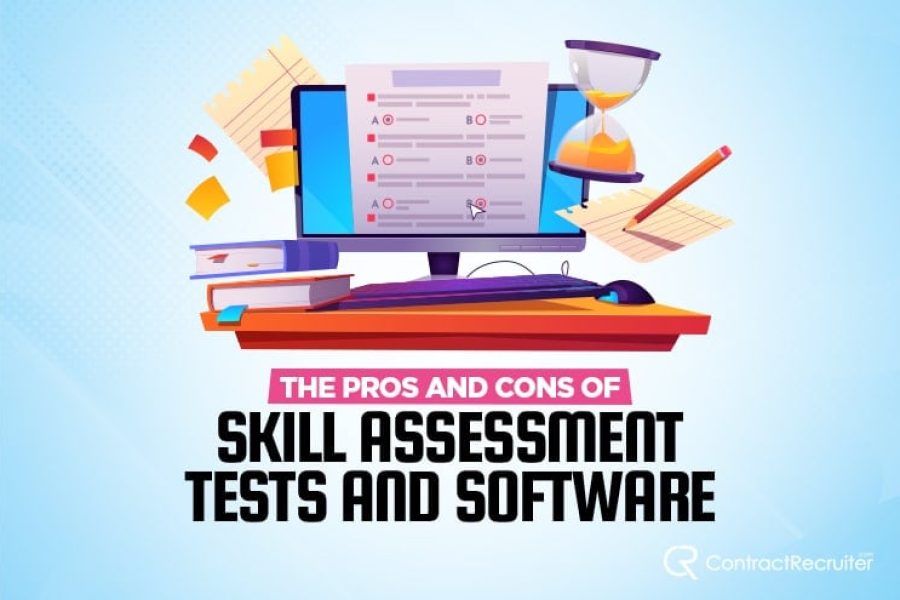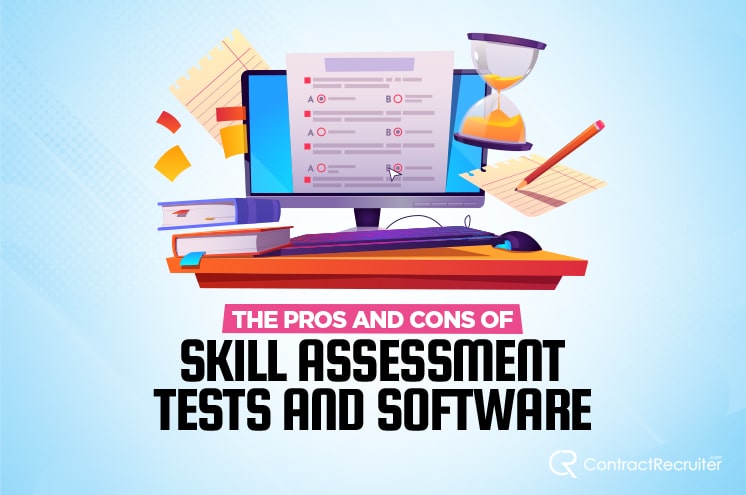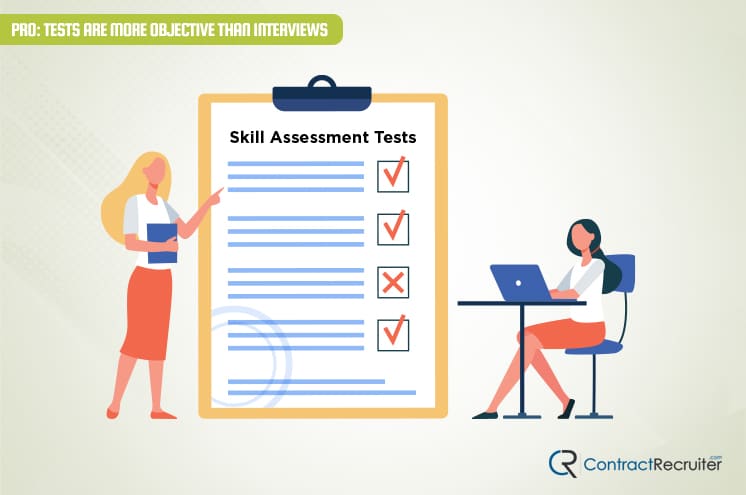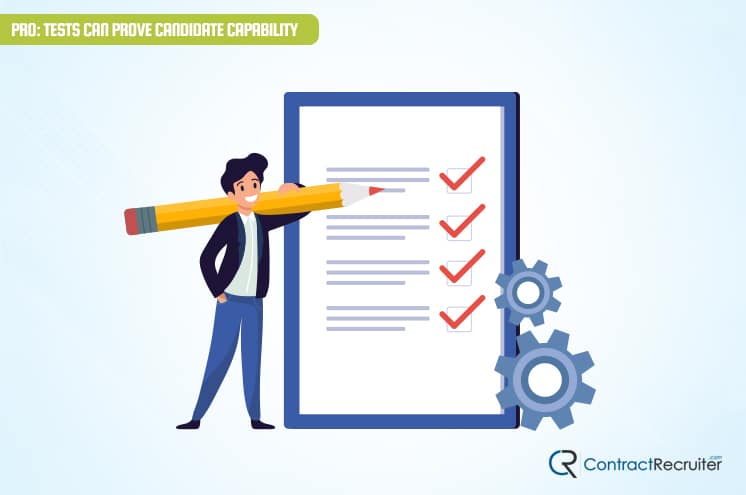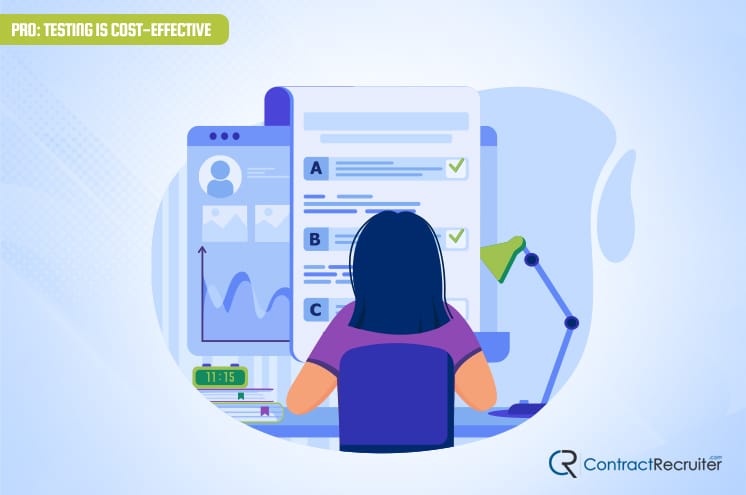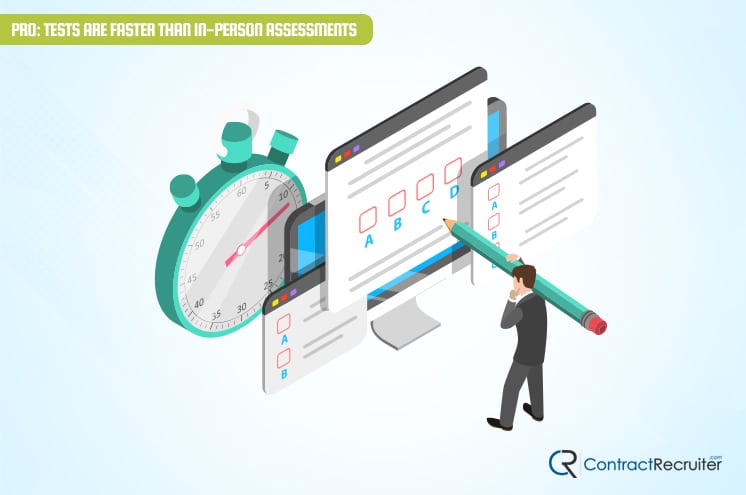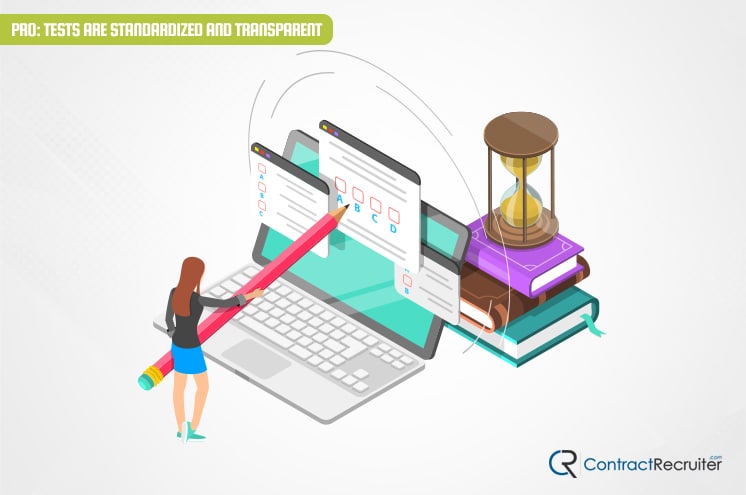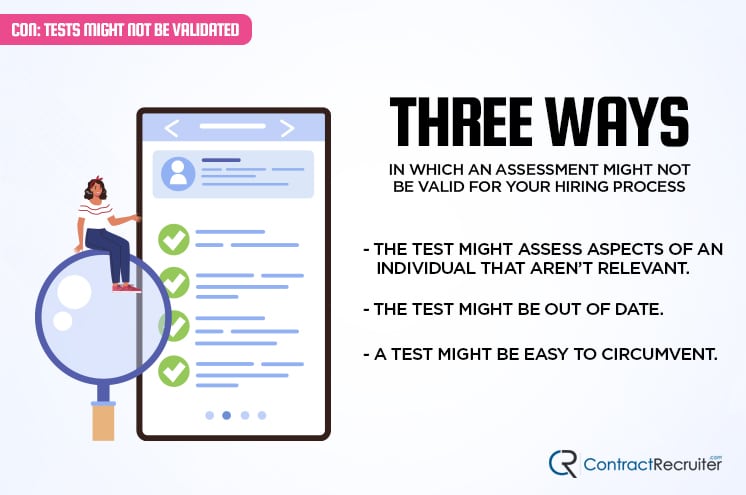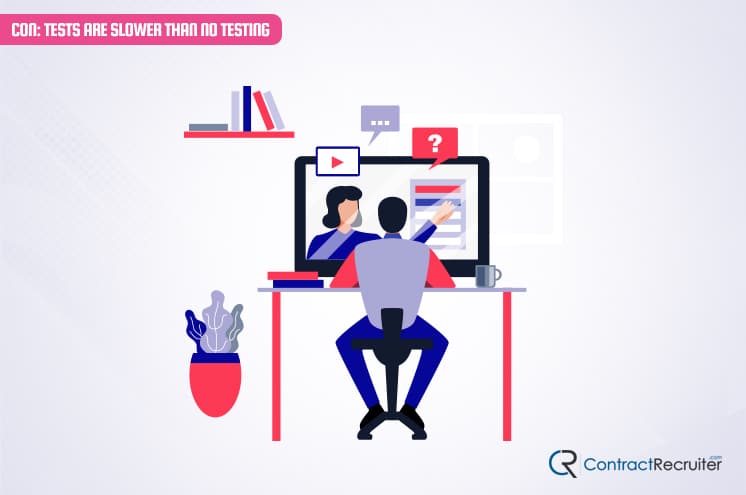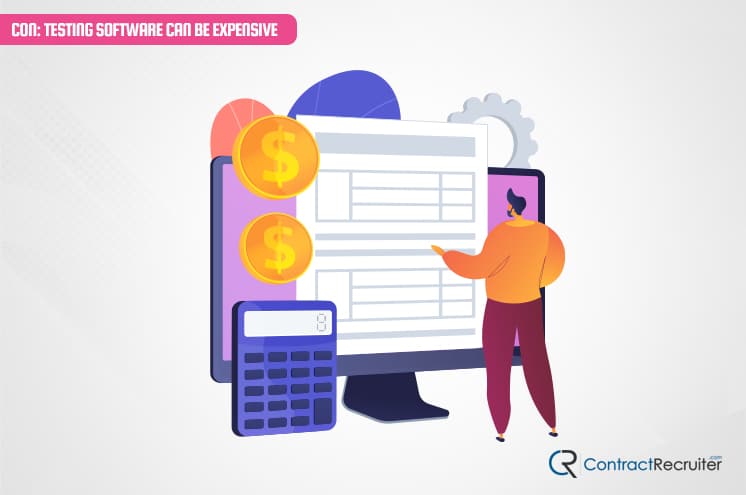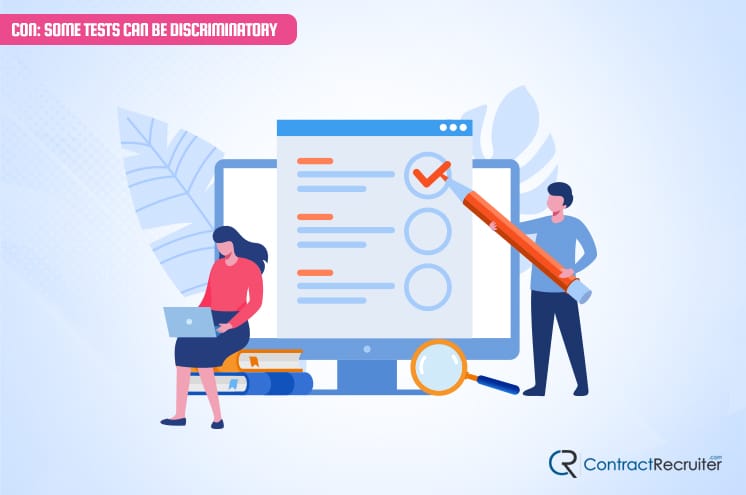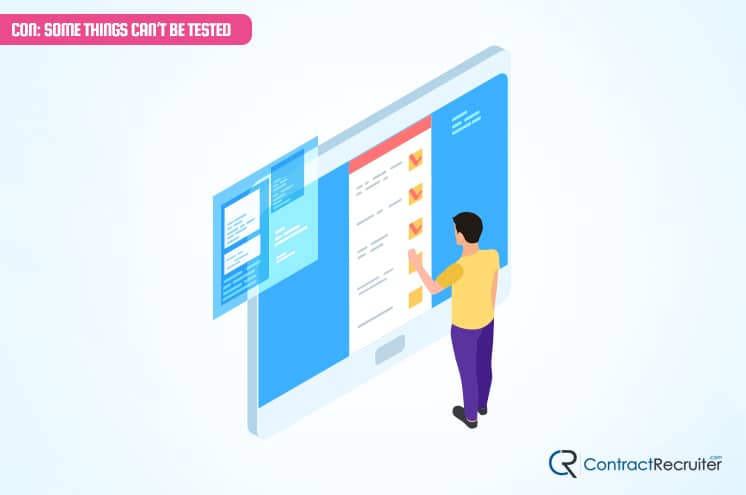Two pressures run counter to one another in the hiring process. On the one hand, you want to be thorough, and you need to make sure that you’re hiring the best possible candidates. Missing a critical character flaw, skill gap, or other indication of a poor worker means struggling to fit them into your team, losing them to churn, and starting the process all over again.
On the other hand, you want to fill your open roles quickly. Every additional screening or assessment takes time. The longer your open position remains unfilled, the more stress the rest of your team is under trying to cover those duties, which lowers your business productivity.
Skill assessments can help you pick out the best candidates from your shortlist, but they also add another layer of time and feedback to the process. There are clear pros and cons to using skill assessments, but what are they? Let’s discuss.
Pro: Tests Can Be More Objective than Interviews
One of the most significant benefits that skills assessments bring to the table is their objectivity. Every candidate receives the same test and is graded based on their answers. Their name, race, religion, location; all of these protected categories are ignored for the purposes of the test. Often, the tests will be fully automated, so there’s not even a chance of a proctor’s bias getting in the way.
Of course, this isn’t a guarantee. Proctored tests, tests that require subjective grading of open-ended questions, and other such assessments might not be objective. Meanwhile, a well-structured interview can be objective and unbiased as well. Simply using assessment software or testing does not guarantee objectivity; it merely provides another route for objective filtering.
Pro: Tests Can Indicate Candidate Capability
The single most prominent benefit of a well-designed skills assessment is the chance for a candidate to prove beyond a shadow of a doubt that they know what they’re doing. A skills assessment for a developer might provide a piece of buggy code and ask for it to be optimized; there’s no way to get around this, the candidate either knows what to do or they do not.
It does depend on the test to a certain extent. Some tests can be “gamed,” while some more common, popular tests have their answer keys leaked online. It’s always possible, as well, that the individual taking the test has external help on hand.
Then again, people working in a job might not need to work in isolation either. If a candidate knows where to go to find an answer, rather than having obscure coding rules memorized, is that not itself proof that they would function well in their role? That’s a determination you’ll need to make.
Pro: Testing is Cost-Effective
If you have a relatively large pool of potential candidates and want to narrow that pool down, a skills assessment is one way to handle it. It’s trivially easy for your hiring department to administer an assessment to an entire candidate pool. All you need is a response informing the candidates that they’ve made it to the next stage of the hiring process, a link to whatever assessment platform you’re using, and the information they need to access the test.
“Candidates can appear for the tests from any desired place of the world as long as there is an internet connection. Hence, the need for infrastructure to conduct the test or to reimburse travel expenses is eliminated. Features like online web proctoring, windows violation records eliminate the need for human invigilation, making the screening process more secure.” – iMocha
Testing platforms do cost money, but that money is a lot less than you would spend otherwise. Think about the costs of bringing a candidate in for an interview. You have their travel reimbursement, if any. You have the time your hiring team spends and the money it costs you to pay them for that time. Only so many interviews can happen in a day, so this can last for weeks. Compare that to the fee an assessment application charges and the time saved by sending out the assessment to everyone in the pool. Yes, you’re spending money, but it’s less money than you would pay otherwise.
Pro: Tests Are Faster than In-Person Assessments
As well as being cost-effective, assessment software is often time-effective for the same reasons. If you have to wait until a candidate is in your building for an interview before you can assess their skills with in-person testing, you have to invest a lot of time and money into every potential candidate.
The primary issue here is that you need to narrow down your candidate pool further before advancing to this stage. A software-based assessment can start early and filter your candidate pool quickly, whereas an in-person interview and assessment should only be conducted near the end of the hiring process, where you’re relatively sure that the candidate will pass.
Pro: Tests Are Standardized and Transparent
Every candidate is given the same assessment, and the answer key is both standardized and available. As long as the test isn’t judged subjectively, the assessment grade can be considered more or less objective.
This objectivity and transparency helps avoid adverse impacts or discrimination in your hiring process. An in-person assessment proctored by your hiring team might lack objectivity. A piece of software will administer the same test to everyone, regardless of their individual qualities.
This does require the assessment software to be designed to be objective. It is an issue in some modern machine-learning or AI-based software; the “black box” nature of the algorithms powering it can be an issue and can open up either your company or the assessment provider to legal claims.
Pro: Tests Can Be Automated
In many companies, the need for new employees is near-constant. You might not necessarily have specific open roles in mind, but you know you always need new workers in certain areas, either due to high turnover, high growth, or high demand.
Testing, then, can become an automated part of your hiring process. Candidates fill out an application and may even have to take an assessment as part of the application process. If not then, you can use preliminary filters to narrow your candidate pool and offer your assessment to only those candidates who pass the initial filter.
All of this can be managed through your applicant tracking system and the testing platform, depending on which software you’re using and how well they integrate with one another. The entire process, from job posting to a shortlist for interviews, can be reasonably automated in an ideal world.
While there are many benefits to using skill assessments and testing as part of the hiring process, there are some notable drawbacks as well. Let’s discuss them next.
Con: Tests Might Not Be Validated
There are three ways in which an assessment might not be valid for your hiring process and your role:
- The test might assess aspects of an individual that aren’t relevant. A test for a developer should test relevant coding languages, not something no one uses directly like Assembly or COBOL (unless the role is specialized for it). Likewise, a test for a developer shouldn’t include physical assessments.
- The test might be out of date. Some skill assessments rely on older ways of doing things that might not comply with modern best practices. Any good testing platform will keep their tests up to date, but this is worth verifying annually at a minimum.
- A test might be easy to circumvent. For example, a popular skills assessment in your industry and role might have its answers available online. In this case, you can’t necessarily trust the results of the test. Did the candidate know the answers, or did they look them up?
Testing needs to be valid and relevant to your role. As such, at least for skills assessments, there is no single test that applies to your whole organization. Each department will need its own assessments tailored to the level of the role sought.
Con: Tests Are Slower than No Testing
While assessment software can automate the process and save you time conducting assessments in person, testing is still another phase of the hiring process that doesn’t necessarily need to exist. Often, assessments will add days of turnaround at minimum, though it can be somewhat mitigated by making them part of an automated process.
Consider a situation where your initial candidate pool needs to be invited to take a test. Your first wave of filtering needs to be done; then, you need to send out invitations to the assessment with a deadline that is reasonable (often a week for turnaround), enough time to grade the assessments if necessary, and the final report to be given to your hiring team. This still leaves you with a list of valid candidates, albeit a smaller one, but adds a week or more to the hiring process.
Whether or not this additional time spent is worth the investment will be a judgment your hiring team needs to make, as it will vary depending on the role, the urgency of the opening, and the skills necessary for the candidate to succeed.
Con: Tests Can Scare Off Good Candidates
Depending on the level of the role, a skills assessment might suppress some of your best candidates. This is most prominent at low and high levels. At an entry-level, candidates might expect a personality assessment, but a skills assessment might be seen as too much. If nothing else, they may not have the skills you want, expecting you to train them. Those who do have the skills might recognize that an entry-level job isn’t for them.
At the higher level, hard skills cease to be as important as soft skills. At the upper management and executive levels, for example, a skills assessment is rarely worth it. You’re looking for leadership and visionary qualities, not hard skills, and those are difficult or impossible to test.
Con: Testing Software Can Be Expensive
Perhaps one of the most significant drawbacks to using a skills assessment platform is the expense incurred. These platforms have a wide variety of costs; some can be as cheap as $200/month, while others can be $5,000/month or more.
Perhaps more importantly, the costs can vary wildly depending on your usage and your needs. Some skill assessment platforms are highly specialized; they’ll work well if you need a developer, but less so if you need a sales rep or vice versa. You may end up needing more than one assessment platform.
Additionally, some platforms charge per assessment or seat rather than a monthly fee, which can mean costs skyrocket when you need a surge in hiring, making the hiring process even more expensive. Depending on your available hiring budget, this can be a challenge to handle.
Con: Some Tests Can Be Discriminatory
Depending on the assessment, it could potentially be discriminatory. Yes, one of the pros up above was the ability to avoid discrimination. However, that only applies to tests that are limited and objective. Tests that are not objective or test things not directly relevant to the role can be used as the basis for a discrimination suit.
“This seems to be a paradox since tests are relatively objective. But cognitive ability and knowledge tests can disproportionately screen out non-white candidates. This can result in costly lawsuits. One example is a 2012 discrimination case where a company had to pay $550,000 in back wages to minority workers it rejected through a pre-employment test.” – Workable.
As with every part of the hiring process, you need to take adequate care to ensure an objective and non-discriminatory system is in place.
Con: Some Things Can’t Be Tested
Many aspects of an individual necessary for their success in your company cannot be tested. It’s challenging, especially with an unmonitored software test, to assess leadership ability, communication skills, ability to work with a team, and other aspects that make for a good employee. Testing can only help refine some elements of your hiring process; it cannot replace them.
Skill assessment platforms and software can be a great boon to your hiring process when used correctly. The drawbacks to using them can be mitigated or avoided, as long as you know, they’re there. Use assessments as necessary, but don’t try to use them for purposes they aren’t meant to serve.

